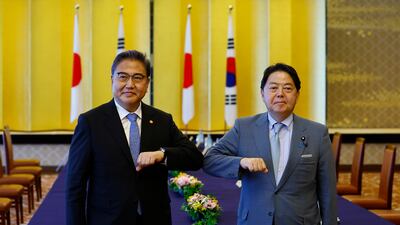Japan and South Korea continued discussions on Tuesday about compensation for thousands of Koreans forced to work in factories during the Japanese occupation of the peninsula between 1910 and the end of the Second World War, one of the most controversial historical issues between the two countries.
The Koreans, who were forced into hard labour, became key for maintaining Japan’s wartime economy, working in coal mines, factories and timber yards.
political analyst
Estimates vary but historians say at least 150,000 Koreans were forced into labour in Japan in the Second World War alone — alongside wartime prisoners from Allied countries and other prisoners from territory under Japanese control. Tens of thousands died, mainly from exhaustion and malnutrition.
In 2018, relations between the two countries soured after South Korea’s top court ordered Japanese companies Mitsubishi, Sumitomo and Nippon Steel to pay compensation to relatives of workers forced into hard labour, as well as a small number of survivors.
South Korean Foreign Minister Park Jin and his counterpart Yoshimasa Hayashi at a meeting in Tokyo on Monday said they would seek an early resolution to the issue of compensation, according to statements from both sides.
Mr Park told Mr Hayashi his government would seek a resolution before courts in South Korea sell off Japanese company assets that have been seized for compensation, the statements said. Mr Park, on the first official visit by a South Korean foreign minister to Tokyo in nearly five years, is scheduled to stay until Wednesday and may meet Prime Minister Fumio Kishida, public broadcaster NHK said.
South Korean President Yoon Suk-yeol, a conservative who took office in May, has sought to improve ties with Japan. He has also backed security policies that take a tougher stance on North Korea and China, and are in line with Tokyo’s — helping the Biden administration as it tries to build a united front among the US’s partners in the Indo-Pacific region.
But Mr Yoon has few good options to resolve the issue of compensation for the conscripted labour, which was a major concern for his progressive predecessor, Moon Jae-in.
Japan sees the issue as “settled completely and finally” under a 1965 agreement that established diplomatic ties and had Tokyo pay compensation. A plan being floated by Mr Yoon for a joint fund between the governments stands little chance of support in Japan, still angry after a fund for women trafficked in Japanese Imperial Army brothels was scuttled by Mr Moon.
Mr Yoon is unlikely to get money for a joint fund, or for South Korea to pay on its own, from a parliament where Mr Moon’s Democratic Party holds a majority and has demanded Japan pay what it sees proper compensation. Mr Yoon, whose support has fallen to lows not seen for a newly-elected president in the country, risks further alienating the South Korean public if he is seen as cosying up to long-time rival Japan.
“It appears that Yoon doesn’t have many groundbreaking options that can resolve this issue at one go,” said Cheon Seong-whun, a former security strategy secretary at South Korea’s presidential office.
“The real problem here is whether Mr Yoon can still proceed improving the bilateral relations despite his low approval rate,” Mr Cheon said.
Meanwhile, cases have been grinding their way through South Korean courts, which have ruled since late 2018 that some conscripted workers were not properly compensated for their emotional pain and suffering. Two of Japan’s largest companies — Mitsubishi Heavy Industries and Nippon Steel & Sumitomo Metal Corporation — have been ordered to liquidate assets in South Korea to pay compensation.
Japan has called those decisions unlawful and in violation of its agreements with South Korea.

